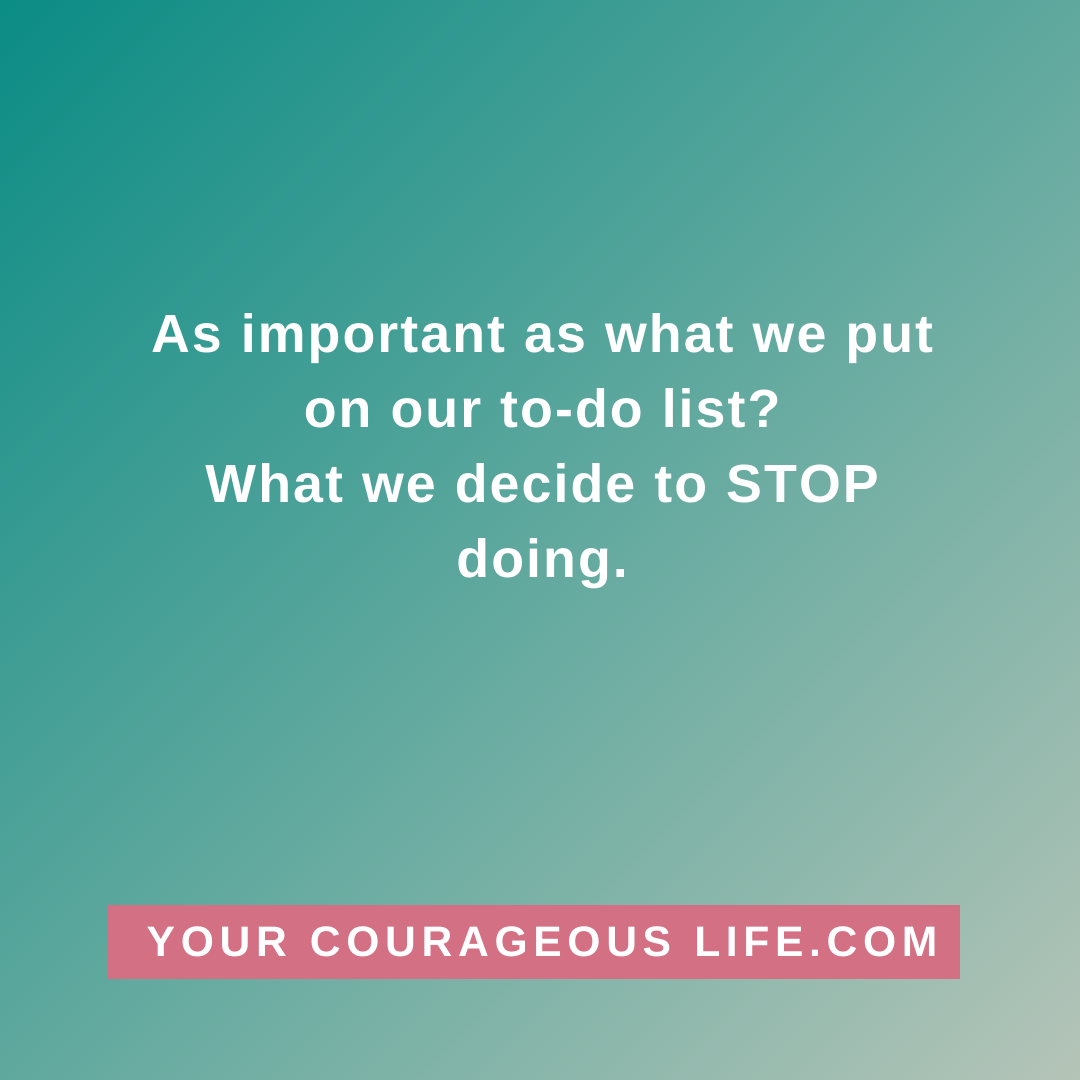Put this on the stop-doing list
Stop-doing lists? Love ‘em. Like reverse psychology, they get me off the treadmill of do, do, do--add add add--and into the space of letting go. (Really, most of us tend to be better with shedding than we do with adding. Reduction, rather than induction...mostly because there’s not much that we need to do in our lives, other than get out of our own way). So put this on the stop-doing list: Stop making things into “problems.
"For example: I hear a lot of people fret that their houses are a mess. Blog posts, facebook updates...you name it. People get really stressed that their house is a mess. Well, then. In my line of vision right now there’s a bevy of clutter in my living room: A book that was sent to me for review; psych textbooks; Moleskine notebook; my printed out binder containing the Fire Starter Sessions; athletic tape and scissors; printer paper that I bought and dumped on the coffee table instead of putting away; a teensy little baby swimsuit that I need to mail to my sister who is with child (due in July--just in time for swim season). There’s also cat hair in corners. And a sink full of pots--we just kind of wash them as we need them, around here.It’s a mess. And--I don’t care. I haven't made "the mess" into a "problem."
Reframing Limiting Stories (Problems)
I'm not into wildly positive affirmations to try to pretend that things don't bother us when they really do bother us. And there are legitimate problems that our world desperately needs to face. This post is about the times when we make things into problems, and how we could make our lives a bit easier if we recognize those times as being limiting Stories, and then start reframing limiting Stories. For instance, I don't see the mess as a problem because my "Story" about it isn't a problem. I think the “mess” of clutter around me is evidence a well-lived life--full, rich... unbalanced in the best possible way. It's not that I’m somehow more laid back than everyone else (just ask my man to get confirmation on that one), nor that I’m a “disorganized person” (you haven’t seen my color-coded filing system or my meticulously organized email folders), nor because we’re dirty (messy and dirty are two different concepts), but rather because at some point I made the decision to not make a messy house into a “problem.” It’s not a “problem,” it’s just...a messy house--a house that’ll get picked up, about once a week, and then slowly cycle back around to being messy again. Because my messy house isn’t a problem for me, I’m freed up from the pressure to house clean and get to do all sorts of other things--like write blog posts, run after my kid, work with our life coach training program participants, read more books. I reframed the limiting Story of "Messy house equals problem" into "Messy house represents something positive. "This begs the question: What would you have more time and energy for, if you weren’t making XYZ into “problems”? Where might life be fuller, richer?
Top Ten Things that You Could Stop Making Into a “Problem”
the messy house (see above)
the laundry (I’m not alone in noticing how many people fret about not doing their laundry more regularly, am I?)
being late (be considerate and endeavour to be on time--but if you can’t be on time due to circumstances beyond your control, let go of beating yourself up, and just flow with it. Other people can freak out about your lateness if they want to--it’s their blood pressure.)
snapping at someone (how does it make any logical sense to go from snapping at someone else to internally snapping at/shaming ourselves? Let go of the “Why did I do that?” shame hangover, and apologize).
social media attention/blog traffic (far better to put the energy into doing your best work and trusting that the right people will arrive).
pissy co-workers or family members (by all means, get out of their space if they’re being unkind, but don’t go the extra mile of making their behavior your “problem”--it’s not personal, so don’t take it personally).
your weight (including referring to your “weight problem”).
other people’s lack of accountability (when we release expectations and attachments, we’re in a much better position to handle the unexpected, including times when others drop the ball).
life balance/ being “well rounded” (who is honestly "balanced"? I’m a teacher/writer/Coach who runs a coach training program, takes photographs, writes books, practices yoga, runs road races, watches documentaries and has a keen interest in how U.S. neo-capitalism results in social injustice--and despite that kind of "well-roundedness" I still have a messy house).
Problems? Nope--not usually. If there are people who love you, if there's a roof over your head, clean water coming out of the tap, food in the belly, and enough time to surf the internet and read this, things are actually probably really great. That’s not an admonishment to “be grateful,” so much as it is a call to get clear----on how vibrantly alive we all truly are, when we “stop-doing” the dance of making beautiful, ordinary, everyday life into "problems."

